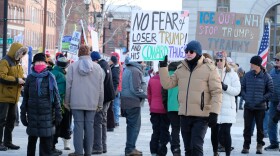The New Hampshire Attorney General is reviewing whether the Massachusetts Department of Revenue is violating either state or federal law as it seeks to collect income taxes from residents of other states during the pandemic.
In March, Massachusetts issued an emergency order clarifying that the state would continue to collect income taxes from residents of other states who work for Massachusetts-based companies, even if those employees were now working from home due to the pandemic.
Sign up here to receive NHPR's email newsletters for more New Hampshire news.
Previously, Massachusetts allowed non-residents to deduct a portion of their taxable income based on the amount of time spent working outside of the state.
That policy benefited the tens of thousands of New Hampshire residents who commuted each day into Massachusetts before the pandemic by potentially reducing their tax burden.
Following a report in the Union Leader on Sunday on cross-border tax collection, Gov. Chris Sununu questioned the legality of Massachusetts’s tax collections on New Hampshire residents during the pandemic, and ordered a full review.
“The N.H. Department of Justice will conduct a review of the [sic] each state’s Department of Revenue's actions to determine whether any state is engaging in improper taxation of our citizens,” Sununu said in a statement. “We will take immediate steps to stop any attempts to impose income taxes on Granite Staters in a manner that violates the law or the New Hampshire or United States Constitution."
Top Democrats on the New Hampshire Senate also expressed concern about the policy.
“Across the board, everyone’s finances have been significantly impacted by the coronavirus pandemic,” said Sen. Lou D’Allesandro, in a letter urging Massachusetts to rescind its rule. “However, workers who have accepted employment in Massachusetts under one set of tax rules should not be forced to accept such a significant change to their paychecks, particularly at such an uncertain and unsteady economic period.” Sen. Dan Feltes co-authored the letter, adding that “these workers are acting in everyone’s best interest when it comes to public health and safety and should not be penalized for their actions.”
Help make NHPR's 2020 political coverage stronger. Tell us what you want to hear.
Massachusetts’ emergency order is set to expire in October. Later this month, the Department of Revenue will hold a public hearing on whether to extend the tax collection rule through the end of the year.








